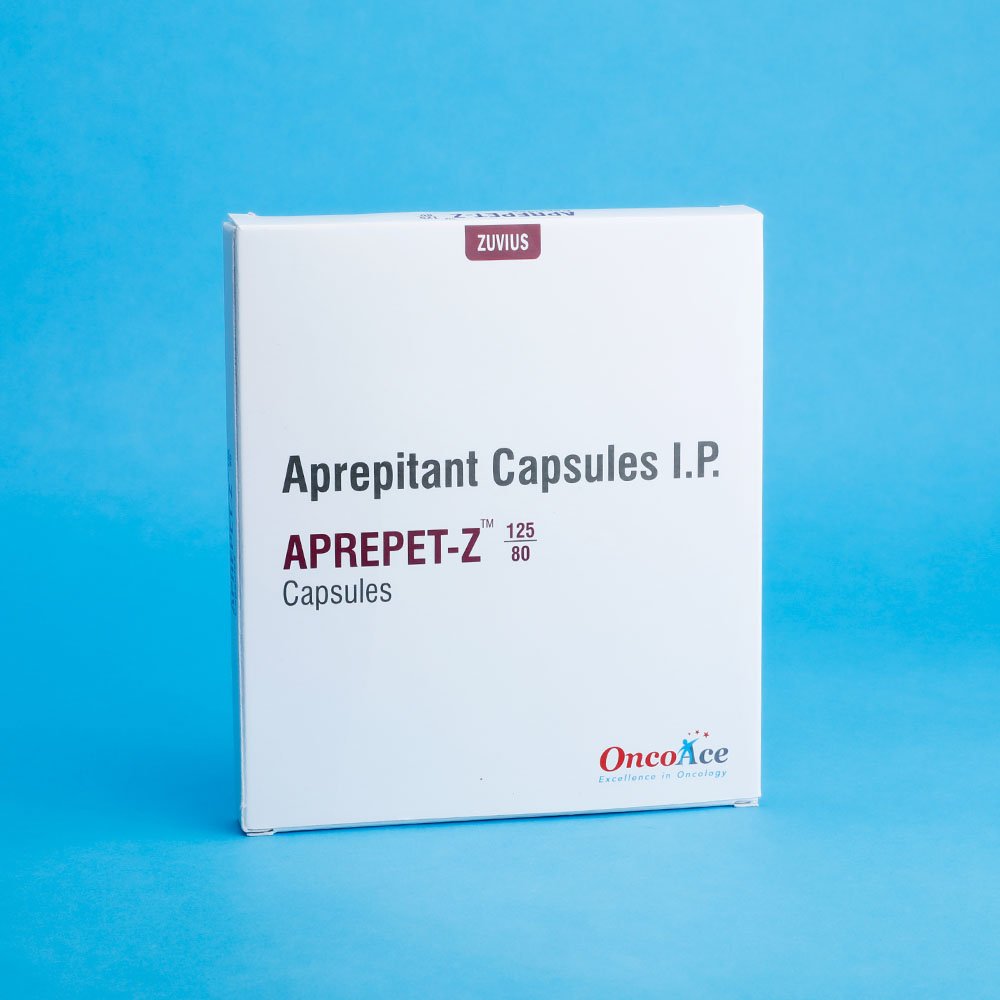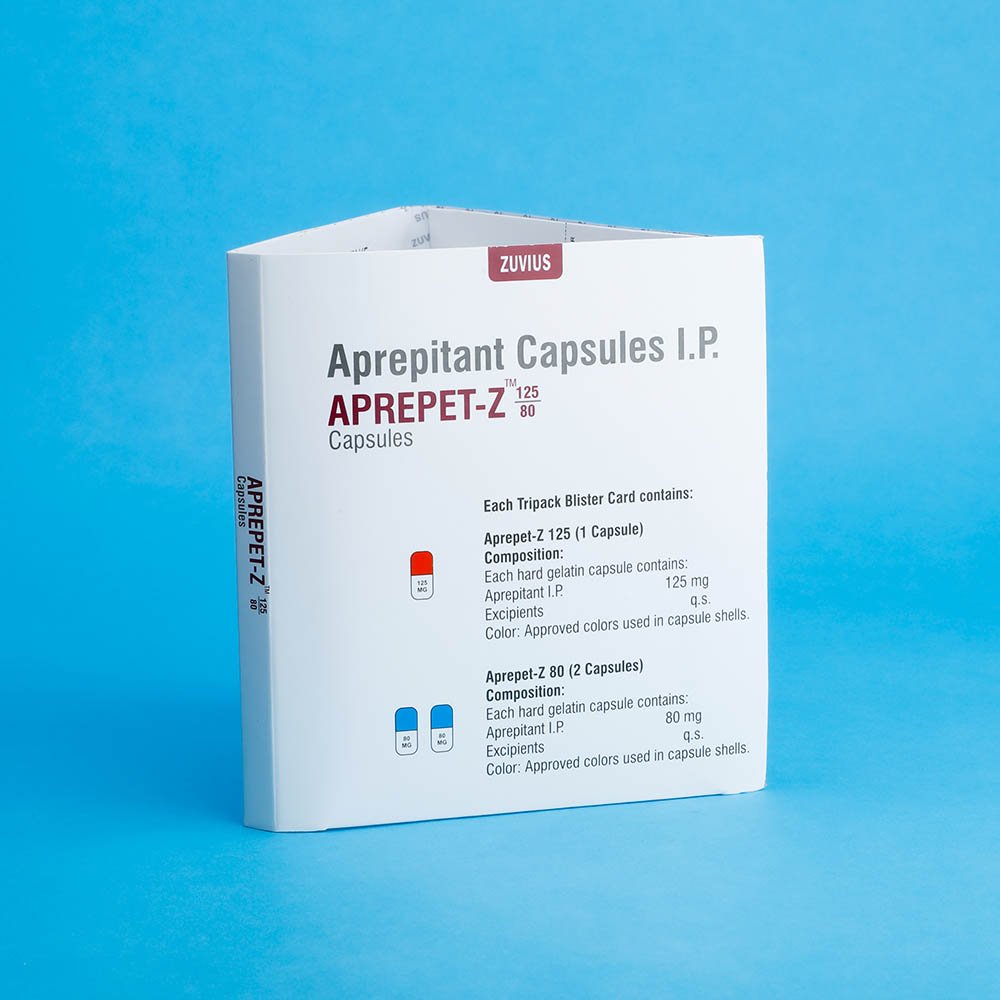Aprepet-Z Combi Pack Cap- Aprepitant Cap
Aprepitant Combi Pack Cap
Strength: 125/80mg
Pack Size: 1 x 3
Drug Class: Antiemetics
Dosage and Administration:
Aprepitant is given for 3 days as part of a regimen that includes a corticosteroid and a 5-HT3 antagonist. The recommended dose of aprepitant is 125mg orally 1 hour prior to chemotherapy treatment (Day 1) and 80 mg once daily in the morning on Days 2 and 3.
Cold Storage: no
Aprepitant is a substance p/neurokinin 1 (NK1) receptor antagonist, chemically described as 5-[[(2 R,3 S)-2-[(1 r)-1-[3,5-BIS (TRIFLUOROMETHYL) PHENYL] ETHOXY] -3-(4-fluorophenyl)-4-morpholinyl] methyl]-1,2-dihydro-3 H-1,24-triazol-3-one. Its empirical formula is C23H21F7N4O3, and its structural formula is :

Aprepitant is a white to off-white crystalline solid, with a molecular weight of 534.43. It is practically insoluble in water. Aprepitant is sparingly soluble in ethanol and isopropyl Clinical Pharmacology.
Aprepitant, for the treatment of adult patients with chemotherapy induced nausea and vomiting.
Aprepitant is a selective high-affinity antagonist of human substance P/neurokinin 1 (NK1 ) receptors. Aprepitant has little or no affinity for serotonin (5- HT ), dopamine, and corticosteroid receptors, the targets of existing therapies for chemotherapy-induced nausea and vomiting (CINV) and postoperative nausea and vomiting (PONV).
Aprepitant has been shown in animal models to inhibit emesis induced by cytotoxic chemotherapeutic agents, such as cisplatin, via central actions. Animal and human Positron Emission Tomography (PET) studies with aprepitant have shown that it crosses the blood brain barrier and occupies brain NK1 receptors. Animal and human studies show that aprepitant augments the antiemetic activity of the 5-HT3 -receptor antagonist ondansetron and the corticosteroid dexamethasone and inhibits both the acute and delayed phases of cisplatin-induced emesis.
Keep out of reach of children.
- if you are allergic to aprepitant, any other medications, or any of the ingredients in aprepitant capsules or oral suspension.
- do not take aprepitant if you are taking pimozide (Orap).
- what other prescription and nonprescription medications, vitamins, nutritional supplements, and herbal products you are taking or plan to take. Be sure to mention any of the following: anticoagulants (‘blood thinners’) such as warfarin (Coumadin, Jantoven); antifungals such as itraconazole (Onmel, Sporanox) and ketoconazole ; benzodiazepines such as alprazolam (Xanax), diazepam (Valium), midazolam , and triazolam (Halcion); cancer chemotherapy medications such as ifosfamide (Ifex), irinotecan (Camptosar), vinblastine, and vincristine (Marqibo Kit); carbamazepine (Equetro, Tegretol, Teril); clarithromycin (Biaxin, in Prevpac); diltiazem (Cardizem, Cartia, Tiazac); HIV protease inhibitors such as nelfinavir (Viracept) and ritonavir (Norvir); hormonal contraceptives (birth control pills, patches, rings, and injections); nefazodone; oral steroids such as dexamethasone and methylprednisolone (Medrol); phenytoin (Dilantin, Phenytek); rifampin (Rifadin, Rimactane, in Rifamate, in Rifater); and troleandomycin (TAO; no longer available in U.S.).
- if you have or have ever had liver disease.
- if you are pregnant, plan to become pregnant, or are breastfeeding. If you are taking or receiving hormonal contraceptives (birth control pills, patches, rings, implants, or injections) during treatment with aprepitant, you should also use an additional method of birth control to avoid pregnancy during treatment with aprepitant and for one month after your final dose.










